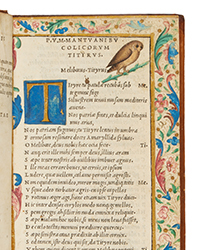Rare Book Monthly
Book Catalogue Reviews - March - 2009 Issue
Travels, Exploration and History from Helen Kahn
By Michael Stillman
Helen R. Kahn and Associates has issued a new catalogue: Voyages and Exploration, History and Biography, War and Peace. What you will find here is a collection of books that range from old to antiquarian, which cover topics historic and serious, and which bring back times when much about the world was still unknown. Most titles are in English, though there are many, as befitting a Canadian bookseller, in French, some in German. Perhaps less typical for this bookseller is that only a handful of titles are significantly tied to Canada. Most involve explorations and other stories whose genesis was in Europe. Now, here are a few of the books being offered.
Item 80 is the first printed eyewitness account of Cook's second voyage: Journal of the Resolution's Voyage, In 1772, 1773, 1774, and 1775. On Discovery to the Southern Hemisphere, by which the Non-Existence of an undiscovered Continent...is demonstratively proved. Not finding something would not appear to be a momentous discovery, though in this case it was. Up to this time, it has been believed that there was a massive southern continent far beyond the size of Antarctica. The author was John Marra, a gunner's mate on the Resolution, but was published anonymously. Marra did not seek credit as no one from the journey was supposed to publish a history prior to the official version. Marra's 1775 book preceded the official account by two years. Marra provided charts that showed the three occasions where Cook's mission penetrated the Antarctic Circle, and his account also spells out some of the intrigue which led naturalist Joseph Banks to back out of participation in the voyage at the last minute. Priced at $12,500.
Item 45 is an important account of Central America from the mid-17th century: The English-American his Travail by Sea and Land: Or, a New Survey of the West Indies... We will cut off the title of Thomas Gage's book there, as it is one of those extremely lengthy headings that almost tells the whole story in its title. Gage, who had gone to Spain in 1612 and entered the Dominican order, determined to travel to Spain's territories in the New World in 1625. This was not permissible, as Spain prohibited foreigners from entering their new lands, fearful that knowledge would lead to other countries trying to seize their land. To get around this, Gage had himself smuggled aboard ship, and for the next 16 years, traveled extensively through Mexico and other Central American territories. He finally returned in England in 1641, signed on as an Anglican priest, and published this extensive report in 1644. It quickly became the most authoritative report on the Spanish territories in Central America available to those outside of Spain. $5,000.
As every American schoolchild knows, Sebastian Cabot discovered America in 1494. Actually, this may be true. He just wasn't the first to discover America. He was more like the millions of other immigrants who also later discovered America. However, this is not what author J.F. Nichols had in mind when he published The Remarkable Life, Adventures and Discoveries of Sebastian Cabot, of Bristol...Discoverer of America... Nichols had to use secondary sources to reach this conclusion, as he was not an eyewitness to Sebastian, and his father, John Cabot's, discoveries (Nichols' first edition was published in 1869). Supposedly, the Cabots landed in Newfoundland in 1494, and somehow this preceded Columbus. Item 88. $400.









